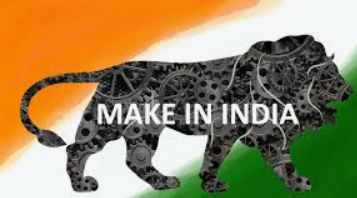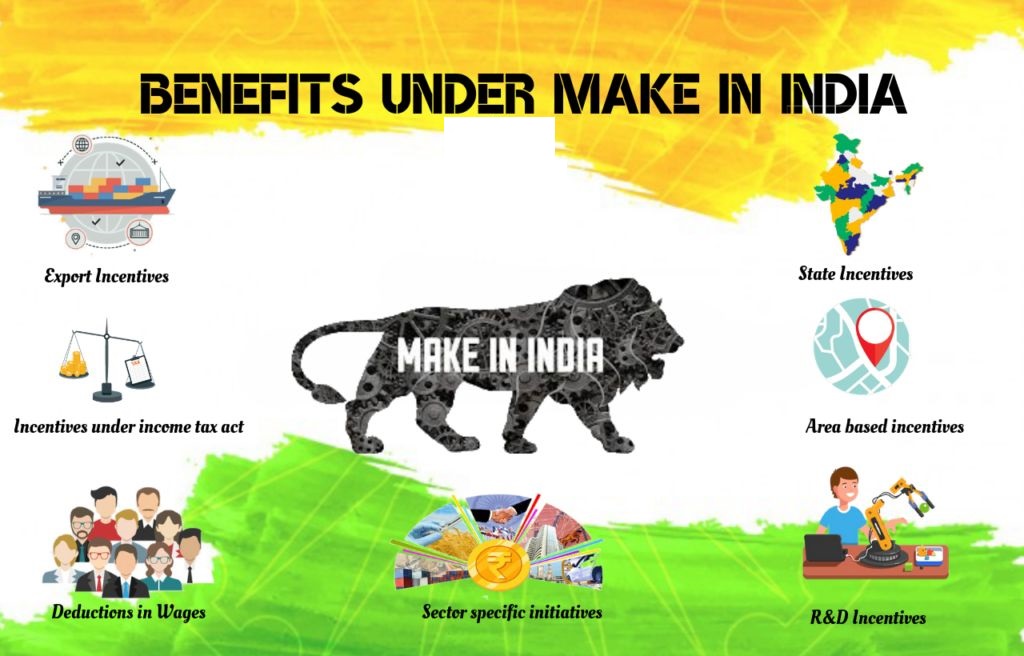Which Sectors get benefits under the Make in India Initiative?
To launch the economy and draw in foreign investment, the Make in India campaign initially included 25 sectors.
The 25 Sectors below are an emphasis on Make in India.
Sectors of The Economy :
* Automobiles ,
* Auto Components ,
* Aviation ,
* Biotechnology ,
* Chemicals ,
* Construction ,
* Defense Manufacturing ,
* Electrical machinery ,
* Electronic system design and manufacturing ,
* Food processing ,
* IT and BPM ,
* Leather ,
* Media and entertainment ,
* Mining ,
* Oil and gas ,
* Pharmaceuticals ,
* Ports ,
* Railways ,
* Renewable energy ,
* Roads and highways ,
* Space ,
* Textiles ,
* Thermal Power ,
* Tourism and Hospitality ,
* Wellness
Today’s manufacturing sector is contributing around 16% to the Indian GDP but the Make in India objective is to make a 25% contribution from the manufacturing industry by 2022. It is an easily achievable goal because right now the manufacturing sector’s contribution is around 34% of the Chinese GDP.
Just because of the import of goods and services from China, the Indian manufacturing industry is contributing this much to them. All can foresee what our nation could achieve if everyone began to support the "Make in India" campaign.
How can you register for Make in India? Make in India Registration Process
A very straightforward 4 Step method is used for making in India registration process. These steps are:
* Step 1: To acquire a digital signature certificate (DSC). The Information Technology Act of 2000 includes provisions for the use of digital signatures on forms-submitted documents to assure the security and validity of the papers.
* Step 2: Obtain an electronic identification number Sections 266A to 266G of the Companies (Amendment) Act of 2006 marked the first appearance of the DIN. The purpose of a digital number for firm authentication is what drives the concept behind a DIN.
* Step 3: Easily set up a brand-new user account on the MCA portal at @mca.gov.in.
* Step 4: Apply for the required firm registration.
Criteria for the Online make in India Registration
* A certificate of incorporation
* Pan Card Copy
* ID Proof
* Address Proof
* Director’s Detail
* Directors Identification Number (DIN)
* Certification for digital signatures
* The most recent mobile or bank statement
* Passport size photo
* Purpose of using the Make in India logo
* Details of patents and trademarks (Optional)
* GSTIN certificate
* OEM certification (Optional)
* Suppliers' purchase bill
Obtaining approval for the "logo" of Make in India:
1. Submit request - The Department of Industrial Policy and Promotion will evaluate each application based on its merit. They would require the Joint Secretary of DPIIT's (Secretary) approval (Department of Promotion of Industry and Internal Trade).
2. Require more information - The Department of Industrial Policy and Promotion reserves the right to request more information in connection with a request to use the "Make in India" logo for events, publications, websites or portals, electronic programs, or other reasons, as it deems essential.
3. Submit a request for the logo to be used in electronic media -
The DPIIT must receive requests to use the logo on electronic media at least 30 days in advance. The following details must be sent in addition to the request:
* Program's nature
* Profile or track record of the game's producers
* The target market
* The program's substance, in particular the inclusion of manufacturing-related material.
Note:- The logo's use for any other reason except those listed above would depend only on the merits of the particular situation. Manufacturing or its related aspects' visibility, impact, and scope would be recorded for future use. After that, the JS can give it their approval (BE-III).
Who is permitted to use the MII logo without permission?
Some organizations can use the MII logo without getting authorization from the DIPP. As follows:
* When Indian embassies and missions support events, publications, publicity materials, and commercials that promote "Make in India," those embassy and mission sponsorships are used.
* The MII logo may be used without restriction by all DIPP offices, officials, and establishments.
* The MII logo may also be used for initiatives run by Union Territory Administrations, State Government Departments, or Central Government Ministries or Departments.
Make in India Certificate/ (MII Certificate)
Make in India was promoted by the DPIIT's public procurement (preference to make in India) orders of 2017. The government of India's aim, as stated in the preamble of this order, is to support the made in India program and stimulate the manufacturing of goods and services in India to raise income and employment.
A supplier or service provider who offers products, services, or works for procurement that satisfy the local content criteria of 50% or more is referred to in this order as a class-I local supplier. The local supplier is required to submit "self-certification of local content" in the required format at the time of the tender, bidding, or solicitation. A self-declaration certificate known as "self-certification of local content" guarantees a specific amount of local content. The MII Certificate is also referred to as the Make in India Certificate.
GeM (Government e-Marketplace) (Government e-Marketplace)
In India, a platform for online public procurement is known as Government e-Marketplace. The Government of India has made it necessary to indicate the "country of origin" on GeM to support the Make in India initiative and Aatma Nirbhar Bharat.
A feature for indicating the amount of local content in items has also been enabled by GeM. To guarantee the percentage of local content in the product, the supplier or sellers must provide "self-certification of local content" (Make in India certificate for GeM/MII certificate) in the approved manner.
Format for Online make in India Registration
Policy (Refer Clause No. 2.8 & 3.4.4 of ITT) CERTIFICATE
In line with Government Public Procurement Order No. P-45021/2/2017-BE-II dt. 15.06.2017, as amended from time to time and as applicable on the date of submission of tender, we hereby certify that we M/s____________________________________ (supplier name) are a local supplier meeting the requirement of minimum Local content (50%) as defined in the above orders for the material against Tender No________________________________________________________ Details of the location at which local value addition will be made is as follows: ------------------------------------------------------------------------------------------------- -------------------------------------------
We also understand false declarations will be in breach of the Code of Integrity under Rule 175(1)(i)(h) of the General Financial Rule for which a bidder or its successors can be debarred for up two years as per Rule 151 (iii) of the General Financial Rules along with such other actions as may be permitted under law.
Seal and Signature of Authorized Signatory
The need for MAKE IN INDIA CERTIFICATION among MSMEs
Only 'Class-I local suppliers' and 'Class-II local suppliers' shall be eligible to bid in the procurement of all goods, services, or works, with an estimated value of purchases less than Rs. 200 crores.
Therefore, to participate in government tenders and public procurements like those on the GeM portal, OEMs must now produce an undertaking of MII.




